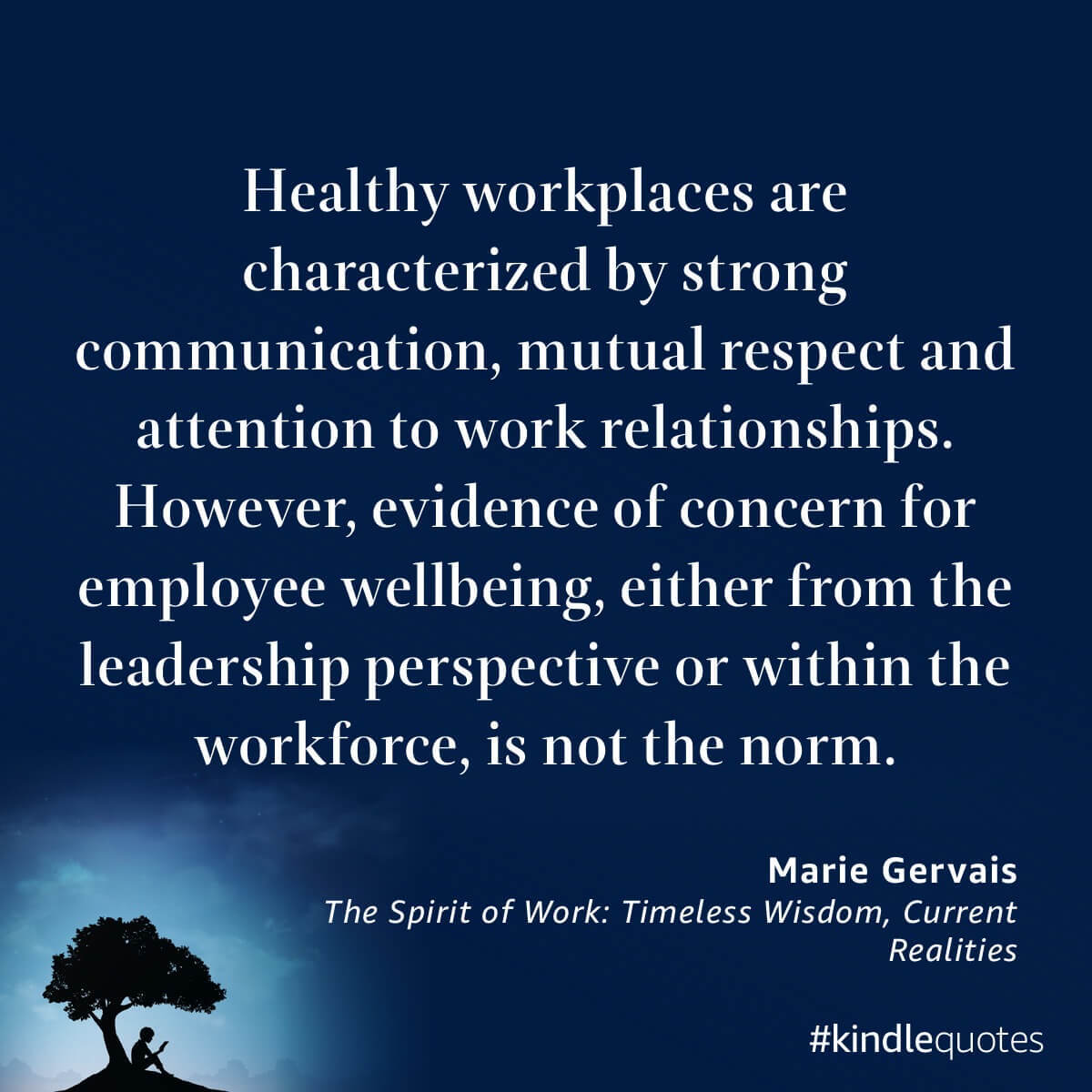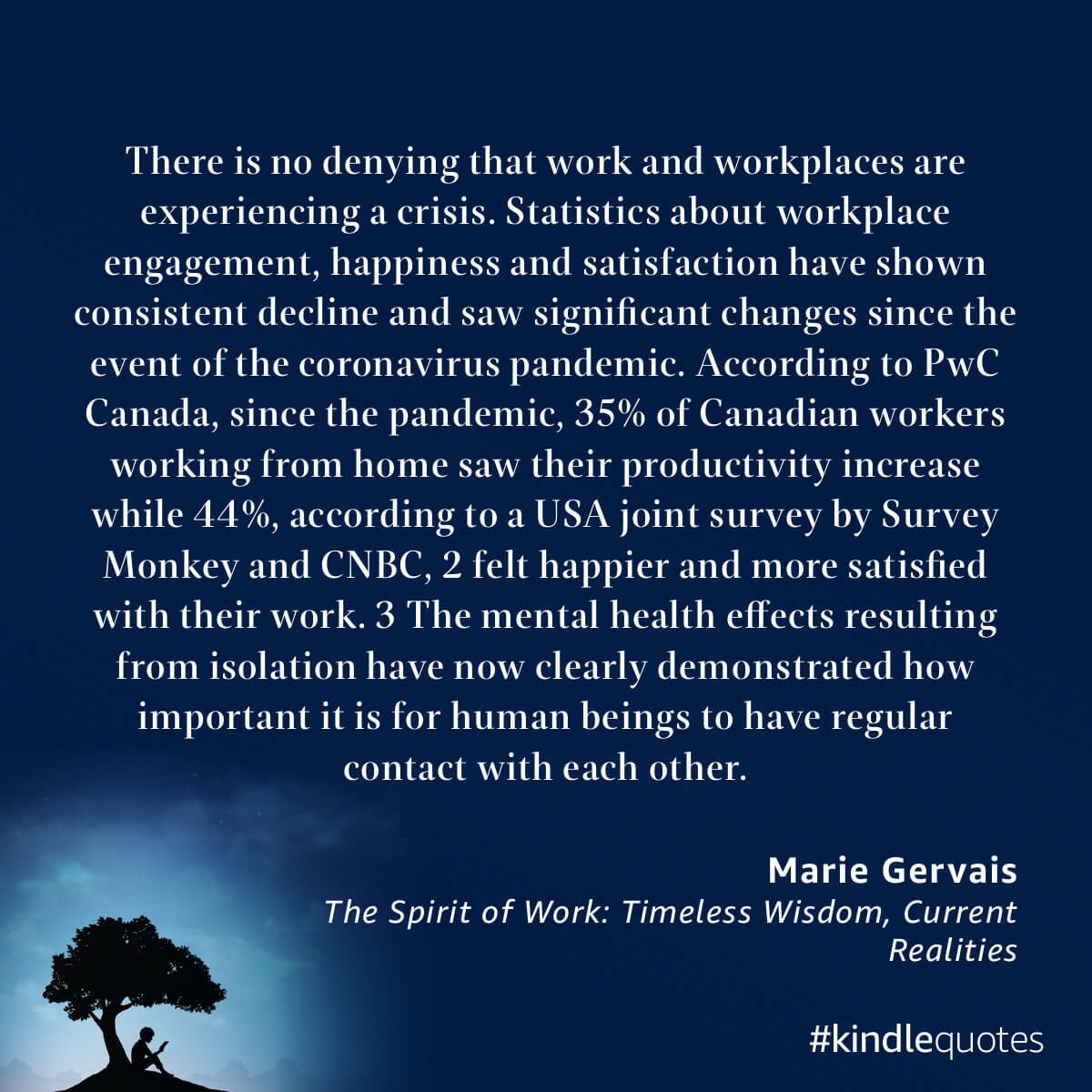“Healthy workplaces are characterized by strong communication, mutual respect, and attention to work relationships” and “there’s no denying that work and workplaces are experiencing a crisis.” (Dr. Marie Gervais, whose newly released book, The Spirit of Work) is “a path to the enhancement of the soul.”
Watch this interview on YouTube here https://youtu.be/md088Ynx0ek

For returning guests, welcome back, and for those who are new here, I’m Andrea Samadi, author, and educator, with a passion for learning, understanding difficult concepts, and breaking them down so that we can all use and apply the most current research to improve our productivity and results in our schools, sports environments, and modern workplaces.
On today’s episode #214, we will be speaking with Dr. Marie Gervais[i] the CEO of Shift Management Inc and the author of The Spirit of Work[ii]," where she offers a high-level yet approachable model in rethinking how we view and structure work. Her book delves into the fascinating relationship between people and work, combining ancient wisdom, modern science, spirituality, and real-world examples to share insights into developing a soul-sustaining workplace culture. She also has a podcast herself, The Culture and Leadership Podcast[iii] where she dives deeper into this topic.
After releasing three interviews this year on workplace burnout, it’s been clear that workplaces around the world are indeed experiencing a crisis, as I’ve had many messages relating to individuals with their specific workplace struggle and Dr. Gervais highlights this new workplace problem in the beginning of her book when she shares that “statistics about workplace engagement, happiness and satisfaction have shown consistent decline and saw significant change since the event of the coronavirus pandemic.” (The Spirit of Work).

If you are a leader, change-maker, or anyone looking to build a humane and sustainable system of work, and can see that something needs to change in today’s workplace, this interview is for you. I hope we can all learn some new perspectives to create happier workplaces where productivity and creativity soars by looking at how to build our future managers with skills that are based on what humans need to succeed and develop in our future workplaces.
In today’s episode we will cover:
- The interconnections between science, business practices and sacred texts as they relate to work
- Find practical tools and workplace examples to apply to management as a soul-enhancing journey
- Rethink common but destructive workplace cultural assumptions
- To see ourselves as a spiritual being with thoughts and actions that have lasting effects
This episode has already made me move from my thinking/intellectual mind, and see what we can learn together when we incorporate our spirit and soul into our daily work.
Let’s meet Dr. Marie Gervais!
Welcome Dr. Gervais! It’s wonderful to meet you. Thank you for coming on the podcast all the way from Edmonton, Alberta, Canada which I always consider my home country, because that’s where I grew up.
Dr. Gervais, congratulations on releasing your new book, The Spirit of Work, that I watched you unbox[iv]. I know how exciting it is to put your heart, soul and mind into something and release it to the world. I related when you said that releasing this book was like pushing a bolder up a hill. How has this journey to release this book been for you?
I’ve got to mention the story behind your episode, because there’s always so many twists and turns with creating content. While researching each guest for this podcast, I put a considerable amount of thought into what I wanted to ask, look for ways that what I want to ask is being mirrored in the world so our interview can help others for years to come, and I begin to connect with that person (I’d say on a soul level) in this research process.
Something that’s never happened to me in all my years of content creation. While preparing for your interview, something unexpected happened and I actually lost the 5-page script I’d written, after I had finished it and sent it to your team. I saved it and then after opening it again, it was just blank. Your team got the blank version. I’ll never know what happened, (and it might not be worth the time to look into that) but the file somehow became corrupt, as you saw, and I had to stop, think about it all, and recreate your questions.
I know there are always lessons to learn with everything we do and I really do think it happened for a reason to make me think hard about The Spirit of Work that I noticed after creating your questions. When this spirit is present, it drives our work in an entirely different way.
INTRO Q: What do you think about this AHA Moment connected to your book and this interview that perhaps I needed to rethink my original questions for you and recreate them from more of a soul level, than mind?
Q1: What does the Spirit of Work mean to you and how did a negative experience from your job led you to continuously ask questions about workplace culture leading you to write this book?
Q2: We have covered the idea that human beings live simultaneously on three planes (our spiritual/soul side, intellectual/mental side and physical side on many episodes, starting with Dr. Daniel Siegel who talked about “Mindsight[v]” as being “the basis for social and emotional intelligence,” or Dr. John Medina[vi] who mentioned Theory of Mind as a way to connect to others on a deeper level, my mentor Bob Proctor talked about paying attention to our spiritual side all the time in the creative process and Greg Link mentioned that even when we die, our spirit still exists. Why is the mind/body/soul connection important to you and your work?
Q3: I do believe that we create what we imagine and that “we build systems around the outcomes of our beliefs to prove the veracity of our beliefs” (Spirit of Work).
How can we build workplaces we love where we can be with others in healthy, enjoyable interactions, that build prosperity and solve conflicts easily? Where do we even begin to make the change that you see?
Q4- I saw a quote that made sense to me, and I’m sure anyone listening would agree that “true leaders don’t create followers” they create more leaders, but often there’s no room for new ideas in our corporate world and its rare, if not impossible to go from the bottom of an organization, to the very top, without someone leaving, proving themselves somewhere else, and coming back with a promotion. Taking this leap outside of an organization (to a new one) is a difficult one, but so often it’s the ONLY way for someone to push past this block and forge their own path.

What’s behind this concept where managers or leaders DO NOT create other leaders, but squash them into a corner, so they have to end up quitting, and proving themselves somewhere else? Is this a fearful leader, and what needs to change for this quote to ring true in more organizations?
Q5: For someone who was promoted into a position of leadership (maybe someone with a tech background who didn’t have to worry about people skills in the past) and they now find they are dealing with people and all their complexity (mind/body/soul). What keys to success would you offer this person to unlock the skills that will accelerate anyone in the workplace?
Q6: What are some common mistakes that you see in the workplace that leaders can avoid with your experience?
Q7: This type of training was left out of ALL the corporate training I ever went through, but was at the center of the work I did while in the motivational speaking industry. We were always looking at how our past would show up in our present-day life, and identify subconscious blocks that might be holding us back. Bob Proctor called them paradigms, or beliefs that have turned into habits over time, that either work for us, or against us. How can leaders help their team members to identify their subconscious blocks to move them forward and towards their goals?
Q8: Your call to “rethink work, informed by new understandings about the greatness we are destined to achieve as a human race” is a noble cause that takes thought from all of us. Maybe it was why I lost my original questions, so I had to THINK about them again, and ask them in a way that they came from my heart (from my emotional side after crying a bit) but it made me think about how I bring my “soul” to each interview. What do you want our listeners to take away from this interview? What are your final thoughts we should all take some time to ponder for a bit?
Q9: For people to learn more about your book, podcast and the work you do at Shift Management Inc, is the best place to learn more, your website? https://shiftworkplace.com/
Thank you for meeting with me today, and sharing your vision for a happier, more productive workplace with the world. You’ve given me a lot to think about, and strategies to shift to soul-enhancing thoughts that bring joy with my work, and ways that we can all shift away from when we are soul-diminishing.
FOLLOW DR. MARIE GERVAIS Website - http://shiftworkplace.com
Twitter - https://twitter.com/shiftworkplace
Email - marie@shiftworkplace.com
c 780-993-1062
www.shiftworkplace.com/the-spirit-of-work
FOLLOW ANDREA SAMADI:
YouTube Channel: https://www.youtube.com/c/AndreaSamadi
Website https://www.achieveit360.com/
LinkedIn: https://www.linkedin.com/in/samadi/
Facebook: https://www.facebook.com/Achieveit360com
Neuroscience Meets SEL Facebook Group https://www.facebook.com/groups/2975814899101697
Twitter: https://twitter.com/andreasamadi
Instagram: https://www.instagram.com/andreasamadi/
REFERENCES:
[i] https://shiftworkplace.com/
[ii] https://shiftworkplace.com/the-spirit-of-work/
[iii] https://shiftworkplace.com/podcast
[iv] https://www.instagram.com/p/CdG1iHVolJP/
[v]Neuroscience Meets Social and Emotional Learning Podcast EPISODE #28 with Dr. Daniel Siegel on “Mindsight as the Basis for Social and Emotional Intelligence” https://andreasamadi.podbean.com/e/clinical-professor-of-psychiatry-at-the-ucla-school-of-medicine-dr-daniel-siegel-on-mindsight-the-basis-for-social-and-emotional-intelligence/
[vi][vi]Neuroscience Meets Social and Emotional Learning Podcast EPISODE #42 with Dr. John Medina on “Implementing Brain Rules in Our Schools and Workplaces of the Future” https://andreasamadi.podbean.com/e/dr-john-medina-on-implementing-brain-rules-in-the-schools-and-workplaces-of-the-future/
No comments yet. Be the first to say something!